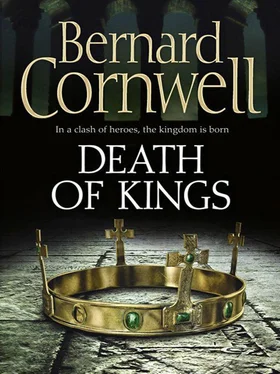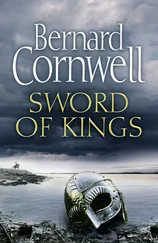The father of England is Alfred. He might not have lived to see the land of the Angelcynn united, but he made that unification possible by preserving both the Saxon culture and the English language. He made Wessex into a stronghold that withstood assault after assault from the Danes, and which was strong enough, after his death, to spread northwards until the Danish overlords were overcome and assimilated. There was an Uhtred involved in those years, and he is my direct ancestor, but the tales I tell of him are pure invention. The family held Bebbanburg (now Bamburgh Castle in Northumberland) from the earliest years of the Anglo-Saxon invasion of Britain almost until the Norman Conquest. When the rest of the north fell to Danish rule, Bebbanburg held out, an enclave of Angelcynn among the Vikings. Almost certainly that survival was due as much to collaboration with the Danes as to the immense natural strength of the family’s fortress. I separated the Uhtred of this tale from Bebbanburg so he can be closer to the events that will create England, events that begin in the Saxon south and slowly move to the Angle north. I wanted him close to Alfred, a man he dislikes almost as much as he admires.
Alfred is, of course, the only British monarch to be called ‘the Great’. There is no Nobel-like committee to award that honorific, which seems to spring out of history by consent of the historians, yet few people would argue with Alfred’s right to the title. He was, by any measure, a most intelligent man, and he was also a good man. Uhtred might be inimical to a Christian society ruled by law, but the alternative was Danish rule and continuing chaos. Alfred imposed law, education and religion on his people, and he also protected them from fearsome enemies. He made a viable state, no small achievement. Justin Pollard, in his wonderful biography Alfred the Great (John Murray, London, 2005), sums up Alfred’s achievements thus: ‘Alfred wanted a kingdom where the people of each market town would want to defend their property and their king because their prosperity was the state’s prosperity.’ He made a nation to which people felt they belonged because the law was fair, because aspiration was rewarded and because government was not tyrannical. It is not a bad prescription.
He was buried in Winchester’s Old Minster, but the body was later moved to the New Minster, where the tomb was sheathed in lead. William the Conqueror, wanting to dissuade his new English subjects from venerating their past, had the lead-encased coffin moved to Hyde Abbey just outside Winchester. That abbey, like all the other religious houses, was dissolved under Henry VIII, and became a private home and, later, a prison. In the late eighteenth century Alfred’s tomb was discovered by the prisoners, who stripped it of lead and then threw away the bones. Justin Pollard surmises that the remains of the greatest Anglo-Saxon king are probably still in Winchester, scattered in the topsoil somewhere between a car park and a row of Victorian houses. His emerald-studded crown fared no better. It survived until the seventeenth century, when, so it is said, the wretched Puritans who ruled England after the Civil War prised out the stones and melted down the gold.
Winchester is still Alfred’s town. Many of the property lines in the old city’s heart are those laid out by his surveyors. The bones of many of his family lie in stone boxes in the cathedral that replaced his minster, and his statue stands in the town centre, burly and warlike, though in truth he was sick all his life, and his first love was not martial glory, but religion, learning and the law. He was indeed Alfred the Great, but in this tale of England’s making his dream has not yet come true, so Uhtred must fight again.
Copyright
Harper Collins Publishers
77–85 Fulham Palace Road,
Hammersmith, London W6 8JB
www.harpercollins.co.uk
Published by Harper Collins Publishers 2011
DEATH OF KINGS. Copyright © Bernard Cornwell 2011. All rights reserved under International and Pan-American Copyright Conventions. By payment of the required fees, you have been granted the nonexclusive, nontransferable right to access and read the text of this e-book on-screen. No part of this text may be reproduced, transmitted, downloaded, decompiled, reverse-engineered, or stored in or introduced into any information storage and retrieval system, in any form or by any means, whether electronic or mechanical, now known or hereinafter invented, without the express written permission of HarperCollins e-books.
Map © John Gilkes 2011
Bernard Cornwell asserts the moral right to be identified as the author of this work
A catalogue record for this book is available from the British Library
ISBN 978 0 00 733178 9
This novel is entirely a work of fiction.
The names, characters and incidents portrayed in it while at times based on historical figures, are the work of the author’s imagination.
EPub Edition © AUGUST 2011 ISBN: 978-0-00-733182-6
About the Publisher
Australia
HarperCollins Publishers (Australia) Pty. Ltd.
Level 13, 201 Elizabeth Street
Sydney, NSW 2000, Australia
http://www.harpercollins.com.au/ebooks
Canada
HarperCollins Canada
2 Bloor Street East — 20th Floor
Toronto, ON, M4W, 1A8, Canada
http://www.harpercollins.ca
New Zealand
HarperCollins Publishers (New Zealand) Limited
P.O. Box 1
Auckland, New Zealand
http://www.harpercollins.co.nz
United Kingdom
HarperCollins Publishers Ltd.
77-85 Fulham Palace Road
London, W6 8JB, UK
http://www.harpercollins.co.uk
United States
HarperCollins Publishers Inc.
10 East 53rd Street
New York, NY 10022
http://www.harpercollins.com
Конец ознакомительного отрывка
Купить книгу












